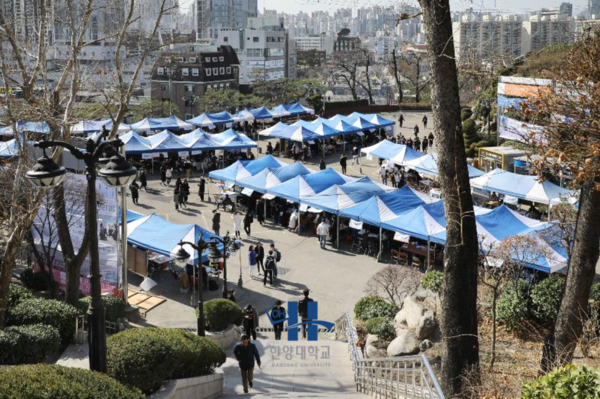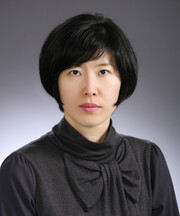
Club activity used to be an important part of campus life as the center of experience and interaction. However, students who have attended Hanyang University (HYU) for the past couple of years were not lucky enough to enjoy this. Since the 2020 pandemic, club activities declined considerably, leading to the break-up of five central clubs out of the 68 on Seoul Campus as of February, 2022. Even more clubs were unable to continue their activities or maintain their status as an official club.
Reason Behind the Difficulties
One of the most pressing difficulties was the restriction on in-person activities due to the pandemic. As offline club activities were categorized as private gatherings as proclaimed by the Korea Disease Control and Prevention Agency, stricter regulations were applied. The restrictions on offline events led to a decrease in terms of the quantity and quality of activities. This resulted in a vicious cycle where students participated less and it became harder to recruit new members. Without enough students, the club culture cannot be passed on to the next generation of members.
Nevertheless, the establishment of the general student council for the first time in four years and the start of in-person classes from the upcoming semester show the continued interest in returning to a vigorous campus life and thriving club culture.
Students’ Stance
As if to prove that 95% of students agree on the importance of revitalizing club activities according to a survey conducted by the Hanyang Journal (HJ), there have been countless efforts around the campus. Student council members and club presidents have encouraged participation by continuing activities online and actively promoting clubs.
‘Uaha’, an English drama club, was one of those to have stopped operating since 2021. But in January 2022, the English Language and Literature Department’s Emergency Planning Committee, named HYU-SEEK, started conducting revitalization programs, hoping to relaunch the club. Ahn Eugene, Chairman of HYU-SEEK, recounted that, “Although this is not the first time that Uaha had to stop its activities, it became harder to continue as students who never experienced offline campus life increased.”
As a student who had participated in Uaha, Ahn was eager to see its continuation. She explained that HYU-SEEK is planning to promote the club at every event, including the Freshman Orientation. She also added how carefully abiding to the current preventive measures of COVID-19 are still necessary for club activities to be revitalized in the long term.
Club Association’s Stance
For HYU central clubs to operate, they are required to be registered by the Club Association (CA), another institution made up of HYU students who are especially working hard to boost club activities. In order to encourage the continuation of central clubs and acknowledging that most have difficulties in maintaining the status, the CA alleviated its registration requirements. From 2020, the minimum number of members was lowered to seven, from 20, which was required before the pandemic.

Kim Ji-hwan, President of the CA, explained how they are currently planning to promote various clubs by participating in freshman welcoming events, and also the Club Exposition that will take place from the 10th to the 11th of March. Furthermore, the CA is currently providing a cleaning equipment rental service to support the efficient cleaning of club rooms. The continued moving, reconstruction, and the prohibition on entering club rooms have left them unoccupied and uncleaned; for activities to restart, a refreshed environment is necessary.
Regarding the future prospects of club activities, Kim stated that the most important thing in order to revitalize the clubs is resuming in-person activities. He added, “Although it might be hard to return to the same club culture that existed before the pandemic, continued support of students is crucial for a new culture to develop and continue.”
Professors’ Stance
Students were not the only ones to miss the in-person club activities. If there were those who witnessed the most dramatic change in the club culture over time, it was the professors. On Seoul Campus, there are currently twelve professors that guide or help their dedicated clubs.

Professor Yun Seong-won has been part of the HJ since 2018. As Executive Editor, she contributed to the HJ in diverse areas, from providing her insights for evaluation meetings to making sure that everything was on schedule. The biggest difference between now and years before the pandemic, Professor Yun recalled, is the difficulty in communication. “The evaluation meeting was replaced with sharing written feedback. Even though some Zoom meetings were better, they could not occur very often, making mutual communication difficult,” Professor Yun expressed how it was a shame being unable to create closer bonds with the students.
Despite the difficulties, HJ, as well other HYU organizations, was able to continue publishing its articles by adjusting to the changed environment. “With Korea’s well-equipped online facilities, HYU clubs have been handling the changes with creativity and flexibility,” Professor Yun further explained. However, she emphasized that there was a limit to conducting all activities without contact, and if possible, offline meetings or at least live Zoom meetings should take place. She also advised, “Continuing to look for things that we can do together now with responsibility and voluntariness will eventually leave us with a valuable experience; after all, you and your club members have shared values!”
The School’s Stance
In order to provide a pleasant environment to participate in club activities, HYU and staff members worked hard to support club spaces by installing air conditioners and heaters, repainting walls and removing asbestos. In 2021, a mass project to move club rooms to the Great Stadium and the fifth floor of the Student Welfare Center was also conducted. Before COVID-19, the Student Support Team (SST) worked to support club activities through diverse events, including the Club Exposition and Spring and Fall festivals. Since most events were inevitably canceled, they are managing the facilities and issuing certificates to prove club activity. Kim Haena, Administrator of SST, remarked how it was a shame to stop various events, and that it is vital the pandemic subsides. She also expressed her gratitude by adding, “I am thankful for the students who are carefully following the preventive measures while participating in club activities.” The SST is currently planning to establish a safer environment through the improvement of club room entrance systems. “We hope that students will be more satisfied with the club activities and encouraged to participate if such inconveniences are minimized,” Kim explained.
Conclusion
There have been many changes and limitations to club activities and university life as a whole. Nevertheless, in order to adjust to the changes and continue the valuable club culture at HYU, the expansion of in-person activities and students’ continuous participation is necessary. The prospect of clubs at HYU remains hopeful, as it seems that students, professors, and staff are all eagerly hoping and working hard for the revitalization of club activities.

